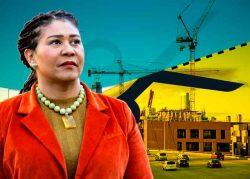The State of California’s Housing and Community Development Agency made headlines this week when it announced its first-ever departmental investigation into San Francisco housing policies and how they may illegally delay or deny housing approvals.
Developers say that even when projects get approved, they won’t be built unless the city makes some major changes, starting with its prohibitively expensive affordable housing requirements and fees that can reach hundreds of millions of dollars.
“We have just laid on too many fees,” said Arden Hearing of Lendlease, whose 30 Van Ness condo and office project is the only high rise to break ground in the city thus far in 2022.
To seal the deal to buy the formerly city-owned 1-acre property at Market and Van Ness back in 2017, and get the $1 billion-plus project approved, the Australian-based developer had to agree to a 25 percent affordable component in the 333-unit project, which is slightly above the current affordability requirements for most large condo buildings in the city.
“I’m all for affordable housing, but the current requirement in San Francisco is not viable or sustainable as a market to get to proper supply and create enough housing,” Hearing said. “Looking at fees and deferral of fees, and then also affordable housing rates, it has to be done or you’re not going to get the housing creation that we need.”
Untenable numbers
In an effort to spur development, in June Mayor London Breed asked the city’s technical advisory committee to reconvene for the first time since February 2018 to address affordable housing requirements as well as the possibility of fee deferrals. The last updates to inclusionary zoning requirements were made in 2017. If the committee, which is made up of four members of the Board of Supervisors and four mayoral appointees, does not bring forth a new plan, affordability component thresholds are due to rise to 24 percent for rentals and 26 percent for condos by 2025.
Those are untenable figures as construction costs skyrocket and sales slump, according to Carl Shannon of Tishman Speyer.
“In today’s economic climate, almost no project can support this, which means virtually no projects are moving forward,” he said via email. “If no projects are built, no inclusionary units are built. As housing advocates have stated in the past, 24 percent of zero is still zero.”
Tishman Speyer’s Mira project was entitled with 40 percent of its 392 units set below market rate, which means they sold for less than they cost to build, Shannon said. Sales in the 40-story tower near the Embarcadero started in 2018 and move-ins began in 2020, with the market rate units making up for the loss on the affordable units. The building is more than 80 percent sold. With construction costs “far outpacing” condo pricing, Shannon said, that math no longer works out.
The fee deferral being studied by the committee is another important change that could allow the New York-based development company to move forward on some of its stalled San Francisco projects, including The Creamery, which was set to bring 960 residential units, a 38-key hotel and 42,000 square feet of commercial space across the street from Caltrain when it was approved by the city’s Planning Commission in 2019. Impact fees for the project would be more than $114 million, according to an analysis by the Housing Action Coalition, which supported the development “as it contributes significantly to the city’s need for new homes in the context of our acute housing shortage,” according to its website.
Reducing fees, or even just delaying them, could get that project moving again, Shannon said.
“Deferring fee requirements, as the city did following the 2008 financial crisis, wouldn’t reduce costs, but it would allow developers to pay fees when a project is completed instead of when the project starts, reducing risk and thereby increasing a project’s chances of securing financing,” he said.
Finance challenge
Securing money in today’s uncertain macroeconomy is a struggle for many developers. Lendlease is self-financing the construction at 30 Van Ness, which is one reason it was able to break ground this year, Hearing said.
Joy Ou of Group I said she is still looking for funding to move forward with her entitled 321-unit project at 1270 Mission in SoMa. Ou, whose Serif Mid-Market condo project started selling last year and recently took a price cut to boost sales, said that with construction costs up and sales down, the city needs to see the reality that projects cannot be built unless backers believe the project makes financial sense.
“We have all kinds of entitlements in our hands, you know why we’re not kicking it off?” asked Ou. “We have no equity partner. It doesn’t pencil.”
She said the city needs to be “more adaptive to market conditions” and speed up the approval process.
“We’re going to have even more shortage in housing if this keeps up,” she said.
Read more



